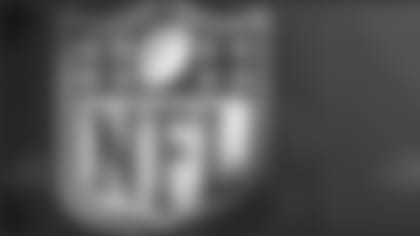NFL VETERAN AND CBS ANALYST RECENTLY VISITED INDIANAPOLISINDIANAPOLIS – Charley Casserly has a unique perspective as an NFL analyst for CBS Sports. Casserly in 2011 will be entering his fifth season on the network pre-game show, a stint that developed after a distinguished 29-year tenure in the NFL with Washington and Houston.
Casserly served as a general manager for 16 of those 29 seasons. Casserly's tenure with Washington spanned the 1977-1999 seasons. He was a part of many successful Redskins teams that thrilled the club's followers. In seeing what the Colts accomplished from 2000-09 when the team set the NFL record for most regular-season victories in a decade (115) and most consecutive regular-season win (23), he notes just what an achievement that was in today's NFL.
"The NFL, (with the) salary cap, free agency, the draft, the feeling was that you'd go in spurts. You'd have a period if you did a good job picking players, coaching and managing you'd win. Could you sustain it and win consecutive championships? I don't think people ever thought you'd see a run like the Colts had. That's really phenomenal," he said. I think it's a testimony to management, with Bill Polian. Picking Peyton Manning, that was not a given. People forget that. Having a philosophy to surround him with the right kinds of players, in other words always having talented wide receivers. Having a tight end to throw to, having running backs. Changing Marshall Faulk for Edgerrin James (in 1999), that took a lot of guts and a lot of foresight. It was the right move to make because you still had a good back and you saved money to put into other positions. Building your defense around a defensive line, if you're going to have Peyton Manning, you're not going to be able to have all-stars at every position because you have to pay him a good part of your salary cap. Knowing which players to pay and picking the right players so for management, they have done an excellent job. Your last three coaches here have been outstanding. So I think all those factors contributed to your success, but it's not something I think people thought could happen."
A period of success like Indianapolis has produced certainly comes from the top of the organizational chart. Casserly notes the fine job Jim Irsay has done as owner and CEO.
"I'm sure Jim has had an evolution through the years. He was a young general manager in his 20s out there making all the decisions. I think that makes him a better owner now, because he understands the ups and downs in the game, which is a crucial part for an owner to understand. There are ups and downs. You're going to have good years. You're going to have bad years. You're going to have player contracts to deal with. You're going to have injuries. You're going to have off-the-field issues. You're going to have draft choices that pan out and some that don't pan out. You're going to have trades that sometimes work and don't work. Having done all those things, I think Jim brings a very unique perspective to it," said Casserly. "I think he's also a guy who has been the front guy out there making the decisions. Being the owner, he has chosen to move into the background and let other people make those decisions. In other words, going back to the tenet, 'Hire somebody, move out the way and let them get their job done.' I think he's done an excellent job here. He's hired good people. He's supported them. He's worked here hard in the city. He's kept the team here with a brand-new stadium, so he worked hard on that. All of those things have made him one of the better owners in the league. Yet, he's not a guy who seeks a lot of publicity for himself."
Casserly has shared the same position as Colts Vice Chairman Bill Polian had with the club from 1998-2010. The two became friends beyond the field by serving together on a prestigious NFL committee.
"Bill and I got to know each other probably the best when I was on the Competition Committee with him. I was on that for a number of years. You spend a lot of time together. You'll spend anywhere from eight-to-10 days in meetings all day long. There is where I think we got to know each other very well professionally and have a friendship. I have tremendous respect for him. He's had a tremendous career. He's a very well-rounded person, and it's privilege to consider him a friend."
Casserly worked hand-in-hand with one of the NFL's greatest coaches in Joe Gibbs while with the Redskins. He notes the type of leadership he sees in Colts Head Coach Jim Caldwell.
"Some people say it's easy to take over a successful program. Actually, it's harder because your expectations are much higher. Number one, the thing that impressed me about Jim when I sat down with him after he took the position was he clearly was his own man. He clearly had his own ideas on how to run the program, but he was smart enough to know to take the best things we (the team) did, keep them and then take the things he thought should be improved upon and put them in there," said Casserly. "What he showed there was he had a lot of confidence in himself, and he did not let his ego get in the way of making good decisions. I think that is an important tenet in a successful leader."
An observer of coaching leadership throughout his career, Casserly claims the three head coaches the Colts have had since 1998 are directly responsible for a large part of the success that has marked the franchise. One particular Colts coach Casserly noted was Tony Dungy. Casserly points out what struck him the most about the style of Dungy.
"I think, number one, his calmness, his steadying influence and demeanor about him. I think it was the old thing, 'Speak softly and carry a big stick.' I think that was the one thing about Tony. Tony was a nice guy. Everybody seemed to like him. I thought he was an engaging individual. His teams, which are a reflection of himself, played hard, played aggressive, played sound. Obviously, defense was his expertise. That's where you always looked for his influence on the team. I thought, good or bad, he had a very steady demeanor about him. I think it is important in a leader, because the players feed off you. If you're up and down like a yoyo, they can't predict who you're going to be. Teams like that will not be consistent either, and I don't think will play with a lot of confidence. They would not have confidence in what he (the head coach) did. That's what hit me about Tony."
One important mode of success Indianapolis has had through the years was to approach each season as a new entity regardless of the results of the previous year. Casserly lauds the job the organization has done in this regard.
"I think one of the things a coach has to do a good job is, 'Every year is a new year.' Coaches say that, but it's a little harder to deal it. You're dealing with great success. You're coming off a Super Bowl victory. At what point do you go to the next season? How long do you let celebrations continue before you begin focusing on the next year? You have a disappointing season, you have an injury season. Any way you look at it, the Colts are winning 10 games every year, minimum. To keep that hunger and drive every year is a challenge for coaches," he said. "I think one of the successes here (Indianapolis) has been the emotional stability of the head coaches of the Colts through this period, Tony Dungy now Jim Caldwell. They're not getting caught up in the successes, but they're bringing it to perspective every year and getting the focus back. I think it has a lot to do with their personality, a lack of egotism on their part. Ego, there's nothing wrong with having an ego, but I never sensed that either one of these guys took themselves too seriously, meaning they were the ones for success. They knew it was a team issue. They understood the fact that every year you had to get over it (the previous year). They were able to sell that point to the players."














